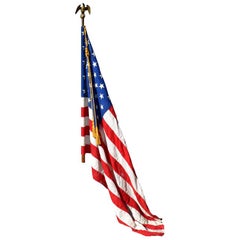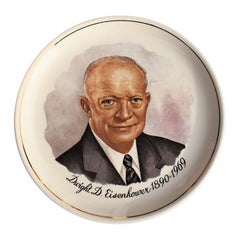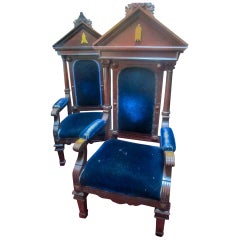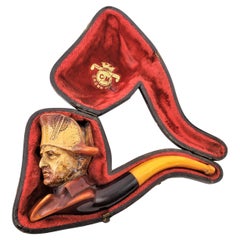Scout Studios Political and Patriotic Memorabilia
2
to
1
2
2
2
2
1
1
1
2
1
1
1
1
2
1
Antique Federal Eagle American 50 Star Flag with Brass Eagle Pole, 19th Century
Located in Oklahoma City, OK
Monumental 50 star American Flag with antique Federal Eagle brass and wood pole. A patriotic piece suitable for any home. This set includes both ...
Category
Antique 19th Century American Federal Political and Patriotic Memorabilia
Materials
Brass, Bronze
President Dwight D. Eisenhower Commemorative Ceramic Plate
Located in Oklahoma City, OK
A round ceramic commemorative plate of President Dwight Eisenhower. The plate is circular, with gold detail around the edges, and a portrait of Presi...
Category
20th Century North American American Classical Historical Memorabilia
Materials
Gold
Related Items
Pair 19th Century Victorian Eastlake Free Mason Throne Chairs w/ Symbolism
By Charles Locke Eastlake
Located in Savannah, GA
Victorian Eastlake large upholstered solid oak throne chairs from Masonic Lodge with lots of detailed carving. The pair consists of one with the plumb bob sy...
Category
Antique 1880s American Eastlake Historical Memorabilia
Materials
Velvet, Oak
Antique Hand-Carved Meerschaum Smoking Pipe of Napoleon Bonaparte & Case
Located in Hamilton, Ontario
This antique well executed hand-carved meerschaum pipe was made by the Drown Pipe company of Vienna Austria and dates to approximately 1900 and done in a Renasissance Revival style. ...
Category
Early 20th Century Austrian Renaissance Revival Tobacco Accessories
Materials
Clay
"Memoirs of Richard Nixon" Two-Volume Set, Easton Press Edition, 1988
Located in Colorado Springs, CO
Nixon, Richard. The Memoirs of Richard Nixon. Norwalk: The Easton Press, 1988. Two-volume set. Bound in full leather with 22-karat gold embossing. Housed ...
Category
Vintage 1980s American Books
Materials
Gold Leaf
34-Star Civil War American Flag, Antique Great Star Pattern, circa 1861
Located in Colorado Springs, CO
The stars of this extremely rare, Civil War-era flag are arranged in what is sometimes called the "Great Flower" pattern, a large star made out of smaller stars -- named as such beca...
Category
Antique 1860s American Political and Patriotic Memorabilia
Materials
Linen
AL Malaikah Vintage Iconic Masonic Shriner Burgundy Wool Fez Hat
Located in North Hollywood, CA
AL Malaikah vintage Masonic Shriner iconic burgundy wool Fez hat.
Al Malaikah, legion of Honor vintage fez hat from the Los Angeles Al Malaikah Shrine...
Category
Late 20th Century American Moorish Political and Patriotic Memorabilia
Materials
Wool
39-Star Antique American Flag with 'Whimsical' Star Pattern, 1889
Located in Colorado Springs, CO
This is a 39-star unofficial American flag, handmade and printed on cotton. The flag dates to 1889 and has a unique history, thanks to its rare star-count.
The flag’s canton is prin...
Category
Antique 1880s American Political and Patriotic Memorabilia
Materials
Cotton
19th c Wooden Ceremonial Fraternal Masonic Crook and Metal Spear on Metal Bases
Located in Savannah, GA
Large size gold gilt wooden ceremonial fraternal Masonic Crook perched on a long painted wooden pole. Supported by a decorative three-footed metal base, the gilt wood crook itself me...
Category
Antique 1890s American Folk Art Historical Memorabilia
Materials
Metal
H 75 in W 5 in D 10 in
AL Malaikah Vintage Iconic Masonic Shriner Burgundy Wool Fez Hat in Original Box
Located in North Hollywood, CA
AL Malaikah vintage Masonic Shriner iconic burgundy wool Fez hat with original box.
Al Malaikah, legion of Honor vintage fez hat from the Los Angeles ...
Category
Vintage 1970s American Moorish Political and Patriotic Memorabilia
Materials
Wool
46-Star American Flag, Antique Printed on Silk, Early 20th Century
Located in Colorado Springs, CO
This is an original 46-star American parade flag, printed on silk. Each star represents a state in the Union at the time. The official flag design would update every July 4th, to inc...
Category
Antique Early 1900s American Political and Patriotic Memorabilia
Materials
Silk
Antique American Flag w/ Hand-Written Inscriptions Mourning the Death of FDR
Located in York County, PA
48 STARS ON ANTIQUE AMERICAN FLAG WITH HAND-WRITTEN INSCRIPTIONS AND AN EMBROIDERED DATE OF APRIL 12TH, 1945, MOURNING THE DEATH OF PRESIDENT FRANKLIN DELANO ROOSEVELT:
American national parade flag with 48 stars, printed on cotton, embellished with hand-written inscriptions and an embroidered date to commemorate the death of FDR on April 12th, 1945.
“On this day in 1945, President Franklin D. Roosevelt died of a massive cerebral hemorrhage at his Warm Springs, Georgia, retreat at the age of 63. Roosevelt’s death in the final months of World War II was met with shock and grief throughout the Western world. Many Americans had no inkling of his decline in health. [He] had been president for more than 12 years, longer than any other person. He led the country through some of its greatest domestic and foreign crises to the impending defeat of Nazi Germany and within sight of Japan’s surrender...
Category
Vintage 1940s American Political and Patriotic Memorabilia
Materials
Cotton
H 19.5 in W 25.5 in D 2.5 in
Antique Hand-Carved Hardwood Figural Confederate Soldier Styled Smoking Pipe
Located in Hamilton, Ontario
This very well executed hand-carved smoking pipe is unsigned, but presumed to have originated from the United States and date to approximately 1920 and done in an American Craftsman style. The pipe stem is composed of vulcanite with a silver plated band. The pipe features asvery detailed and realistic carving of a Confederate soldier...
Category
Early 20th Century American American Craftsman Tobacco Accessories
Materials
Hardwood
H 3.5 in W 1.5 in D 8.75 in
Antique 46 Star WMH Horstmann Company United States of America Flag 83"
By Horstmann
Located in Dayton, OH
Antique forty six star large wool American flag by Horstmann Company, circa 1908-1912.
Horstmann firm was founded by William H. Horstmann (1785-1850), who had immigrated to Philadelphia from Germany. Horstmann bought out a local swordmaker in 1828 and thereafter entered the military goods field. The firm benefitted from the Civil War, becoming the largest military goods supplier in the nation by 1864.
WILLIAM H. HORSTMANN & SONS, Manufacturers of Dress Trimmings and Military Goods. 5th & Cherry Streets, Philadelphia, PA.
This house was founded, in 1815, by William H. Horstmann, a native of Cassel, in Germany. He had learned the trade of silk-weaving in France, and, emigrating to the United States in the above-mentioned year, established himself in Philadelphia as a manufacturer of fringe, laces and trimmings of various kinds. He married the daughter of Frederick Hoeckly, a German settler in Philadelphia, and also a manufacturer of fringe, coach-lace and tassels. He devised several improvements in this trade, especially by introducing varieties in the styles and patterns of this class of goods, there being at that time only two patterns used in the trade, which were known as the Jefferson pattern and the Monroe pattern.
In 1824, he introduced into this country from Germany the use of plaiting or braiding machines, and about the same time he was the first to introduce into this country the use of the Jacquard loom, for weaving patterns in textile fabrics. His location was in the first instance at No. 50 North Third street, but within a short time he removed to a store next to the Harp and Crown tavern, afterwards known as the City hotel, and continued his business within a short distance of this point for many years.
In 1828, he commenced the manufacture of military trimmings as a special department, and this branch has grown to most important proportions, Horstmann's military goods being in demand throughout time country. The firm have also executed large Government contracts in this line for the War and Navy Departments. In 1831, he established a branch house in New York city, and about the same time erected a factory at the corner of Germantown road and Columbia avenue. The factory was continued here until time erection of the extensive building at Fifth and Cherry streets, where the works, salesrooms and offices of time firm now are. This massive structure is six stories high, and extends 140 feet on Fifth street and 200 on Cherry street, and reaches back to Race street. The separate departments into which the business is divided are thirty in number. More than 1000 distinct looms and machines are in use in the building, many of them very costly and some invented and used exclusively by this firm, the motive power being supplied by a steam engine of fifty horse power. The area covered by the works is about 11,000 square feet. Time number of hands employed is very large, about 500. When the erection of a vast factory at this point was first proposed, a strong opposition was made by time holders of the neighboring property. The ancient German Lutheran Church and burying ground, since removed, stood opposite the site, and a bill was introduced into the Legislature to forbid the use of a steam engine within 100 yards of any place of worship. The interests which such a bill would have affected injuriously, especially those of several newspapers, roused a strong opposition to it, and it failed to become a law. In 1845, William H. Horstmann, the founder of the house, retired from the business, and his two sons, William and Sigmund, assumed the management and it was under their direction that the new building, above described, was erected.
The goods produced by this house are of almost endless extent and variety. They include goods woven from all the various textile fibres—cotton, wool, silk, etc.—in every style, color and pattern, and are used for an infinite number of purposes. Narrow woven goods are time staple production, made up into material for dresses for both sexes, for use in daily life, and for regalia for ""societies;"" for the costumes of the stage, the upholstering of houses and of carriages, the uniforms of soldiers, together with equipments for the same, and for funeral purposes. The raw material used in the manufacture is to a great extent very costly, and their store rooms often hold as much as $200,000 worth of goods in an unworked state. There are two rooms devoted to power looms in the factory, one for coach lace and one for other styles of weaving, in which about 250 of these machines are constantly running. The braiding machines in the coach lace room are very noteworthy. The cord to be covered with braid is drawn through an opening in time middle of a flat, circular, metallic plate, about 15 inches across. Up to a point on this cord, about a foot above the plate, the threads of the braiding material converge, like the ribs of a tent-roof, and there weave in and out and out and in, as the coating of braid grows, and time covered cord rises and is wound away above. The weaving is accomplished by the motion of the spools below that carry the different threads of the braid. These spools stand in uprights, which are carried round and amongst each other in curved slots in the above-mentioned broad metallic plate. All but two of these spools run in and out among each other, with a swift, easy and intricate motion, mind so rapid that time eye can hardly follow it, while one or two special spools run steadily round and round among time twisting spools with the most extreme swiftness. Many other machines, displaying equally ingenious mechanism, are used in the factory. The various details of equipment manufactured and supplied by this house are also important, both for their number and the superior quality of the manufacture.
The one article of swords may be taken as an instance. This trade grew naturally and immediately out of the established army and navy goods department of the works, it being necessary that the sword itself should be furnished together with the sword-belt and other trappings all complete. Every part of the sword and trappings, with the exception of the blade, is made on the premises. The blades are almost all imported from the ancient German sword-blade emporium of Solingen, where, it is said, swords have been made ever since the year 1147, when Count Adolphus of Berg brought home from the East and established there the business of forging Damascus blades. There is in this department a stock of some thousands of blades, of many different patterns and sizes, ready to be set and finished. Any style or sword can be had from this warehouse, from the plainest kind up to a presentation sword...
Category
Vintage 1910s American Classical Political and Patriotic Memorabilia
Materials
Wool



